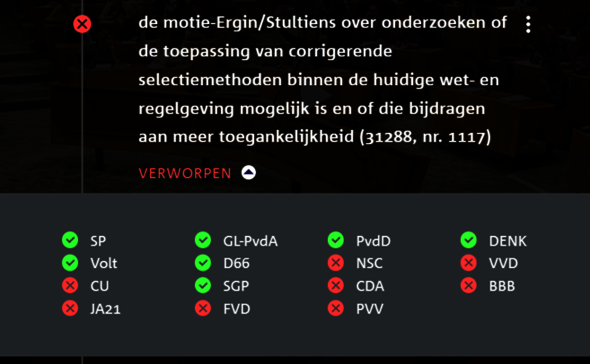Positive discrimination in selection process? No, says House of Representatives
A majority of the House of Representatives has already indicated it is against positive discrimination in the selection process for programmes such as medicine and physiotherapy. There’s no need for the cabinet to investigate whether some groups should be given a greater chance.
Selection at the gate of programmes isn’t neutral, various research shows. Without good reason, some groups of young people have an easier time getting through the selection process than others. Many programmes are doing whatever they please, says the Inspectorate of Education.
The exact cause is up for speculation. But if, for example, your parents don’t make a lot of money or haven’t gone to university themselves, it’s harder to get a spot on a programme with limited enrolment.
Is there anything we can do about this, Denk and GroenLinks-PvdA wonder. They call for positive discrimination, or in their words: corrective selection methods. Perhaps the chances of some groups can simply be increased a little bit. The government would have to look into this.
No
A majority of the House of Representatives thinks this is a bad idea. The motion was rejected on Tuesday. The parties that voted against it included the four currently in talks to form a new coalition government (PVV, VVD, NSC and BBB), as well as CDA and ChristenUnie.
The main consideration of the no voters is that they don’t want to lower the bar, last week’s debate on the future of further education demonstrated. They would prefer to have a ‘blind’ selection process, where the best candidate wins.
But that selection process would have to be done by the book. This is why another Denk motion did get a majority vote. The government has to take stock of the methods used by the programmes and the effect thereof.
Equal opportunity programme
What’s more, a majority of the House of Representatives wants to reintroduce the equal opportunity programme for students from the Caribbean Netherlands. Which is remarkable, because in the end this is also a type of positive discrimination. Thanks to this equal opportunity programme, these students don’t have to compete with students from the European Netherlands in the selection process.
The equal opportunity programme was terminated when drawing lots for restricted enrolment programmes was banned. Since then, it has proven more difficult for Caribbean students to get a spot on a medical programme, which affects healthcare on the islands.
As of this academic year, programmes are again permitted to replace the selection process (or part thereof) with drawing lots. Several medicine programmes are considering doing so.



Discussion